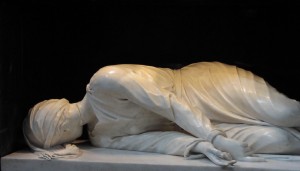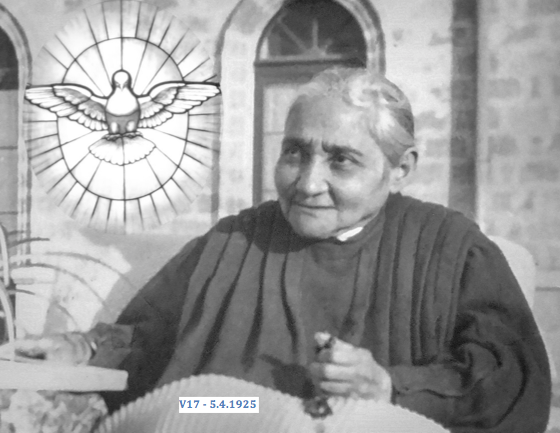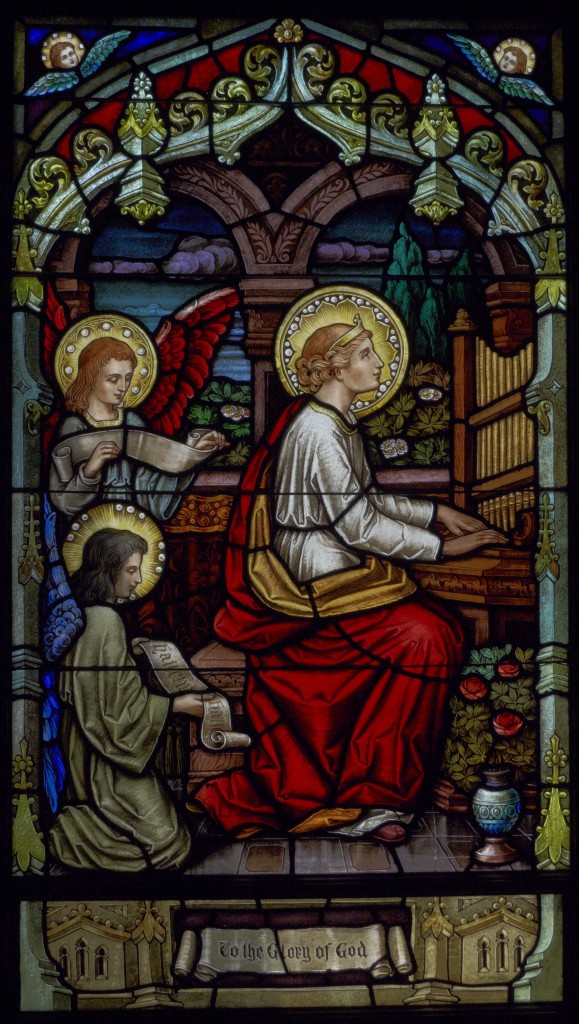Born at Rome, of the illustrious family of the Coecilli, Cecilia as a child consecrated her virginity to God. Forced to marry Valerian, a young pagan, she said to him: “Valerian, I am placed under the guardianship of an angel who protects my virginity.”
Valerian declared that he would believe in Jesus Christ if he saw the angel. Cecilia sent him first to Pope Urban, in the Catacombs, to be baptized. Valerian saw the angel, and got his brother Tiburtius to be baptized; he also saw the angel. A short time after, both brothers were martyred under the prefect Almachius.
Finally the latter arrested Cecilia and ordered her to be put to death in her home. This was about 230 A.D. Her body was discovered in 1599 by Cardinal Sfondrati, just as it was at the moment of her death (see end of this post).
The name of St. Cecilia is mentioned in the Canon of the Mass.
“At the sound of musical instruments,” says the formerlly celebrated first antiphon at Vespers, “the virgin Cecilia sang to God in her heart.”
St. Cecilia is the patroness of musicians.
St. Cecilia
***
Selected Letters of the Servant of God Luisa Piccarreta to Mother Cecilia
33. To Mother Cecilia
J.M.J.
Fiat – In Voluntate Dei!
My good and reverend Mother,
I feel the certain hope of finding you in the Divine Volition, Which possesses the fullness of all goods; therefore there is no good which I cannot wish you on the beautiful day of your Saint Cecilia. So I wish you the peace of the Fiat, that may make full day arise in you, always serene, so that the darkness of the night, of disturbances and oppressions may have no place. Peace can be called daylight of God, in which the Divine Volition forms Its day of ever growing sanctity, and ever new graces. Dearest Mother, one single act we do in the Divine Will is so great as to surpass the greatness of Heaven and earth; it encloses immensity, power, and all goods. Therefore my wish for you is that all your life be a continuous act of Divine Will, and then you will have love for all, a sanctity that makes up for all and encloses God Himself. And when God is with us, what beautiful and good things can we not receive and accomplish? I could not wish anything more beautiful than the peace of the Divine Will. It will be your guide, It will sustain you and comfort you in the circumstances of life, and also the bitter ones, which are never lacking.
I leave you in the Divine Volition, so that the feast of Saint Cecilia may be more beautiful, and may be the echo of the feast of Heaven. My sister kisses your right hand and sends her affectionate and sincere wishes. And I, renewing my wishes, kiss your right hand. Most affectionately yours,
the little daughter of the Divine Will
Corato, November 20, 1937
***
64. To Mother Cecilia
In Voluntate Dei!
My good and reverend Mother,
I received your dear letter, that consoled me very much. Thank you from the heart. In these times my state is very painful, because of the books and other things; but in my poor heart I have the sure hope that these will be the last gems that my dear Jesus will place on my little crown. And when I feel my hear suffocating with sorrow, I hide in the Divine Will and in It I find the necessary strength. What a magic force, what powerful magnet does the Divine Will possess! In the hardest pains It knows how to give rest, placing Its balm on the most embittered wounds. So, my dearest Mother, let us never move from within the Fiat. It will form Its divine room in us, in which we will find Jesus, Who will take us in His arms… He will nourish us with the precious food of His Will. He will cover us with love, hiding all our sufferings in His own, in order to make us more like Him; and in His emphasis of love, He will say to us: “My daughter, do not fear, I Myself will be your life, your strength, your All. We will live together and form one single life. How happy we will be!”
Now, this is my wish for Saint Cecilia: that the Fiat give you Its divine room, in which you will live one life with dear Jesus. I can tell you nothing but this: may the Divine Will cover you and hide you within Itself, but so much as to feel nothing but Will of God within you …
Thank you, thank you for everything. May Heaven repay you with blessings, and hide you more in His Will, so that the earth may turn into Heaven for you, and all things may be bearers of Divine Will.
I renew my wishes together with my sister. I believe that this year I am the one opening the wishes for Saint Cecilia – wishes of peace and of union. Pray for me. Leaving you in the Divine Will and kissing your right hand, united to my sister, I say,
most affectionately yours,
the little daughter of the Divine Will
Corato, November 10, 1938
***
105. To Mother Cecilia
In Voluntate Dei!
My good and reverend Mother,
I feel the duty to send you my wishes for your Name Day of Saint Cecilia. She was a martyr of blood, and I wish you a greater martyrdom, more noble and divine, more heroic and more accepted by God – that is, the martyrdom of the Divine Will. This martyrdom surpasses all other martyrdoms; even more, as many times as you do the Will of God instead of doing yours, so many times will you be able to say: “I am martyr for You; the martyrdom I offer You is not of blood or of flesh, but with my will united to Yours, I offer You a divine martyrdom.” Goodness of God! If only our acts enter the Divine Volition, everything is changed into divine in us, and what is human has no longer life.
Here is my wish. I could not send you a more beautiful one; more so, since the opportunities are not lacking. In all circumstances, even painful, you will have a refuge in which to take shelter. Jesus is waiting for you open arms to receive you and to help you to form in you the noble martyrdom of the Divine Will.
Now let’s come to us. The Lord has allowed that you go far away, without even seeing each other. Fiat, Fiat! And it also seems that you want to forget me: Fiat to this as well. But I beg you to never forget to pray for me, poor creature, and from the heart I will do it for you. It seems to me that I had in you a far away mother who had a thought for me. Now, Fiat. Let us remain always united in the Divine Will, from which we will draw the strength and the sanctity He wants from us.
My sister sends you her wishes and kisses your right hand, and I leave you in the Divine Volition to make yourself a saint. Pray for me. Kissing your hand, I say,
Most affectionately yours,
The little daughter of the Divine Will.
***
115. To Mother Cecilia
My good and reverend Mother,
Here I am to you, after such a long silence. Dear Cecilia makes the thought arise in me of sending you my wishes. But what wishes could I send you? And here is the Holy Divine Will, which comes before me and says: “My Will never ends; I have always to give. Therefore, send her, as wish, my Love which rises continuously, my sanctity which is ever new, my virtue which is always working. I never tire of speaking, but I also want to receive the little love of the creatures – their will into Mine, to be able to dispose them to receive into their will the prodigies which my Divine Will can do.”
Here is my little wish: your will at the mercy of the Divine Will. In this way you will feel in you the Sanctity, the love and the works of the Supreme Fiat as your own. Your life will no longer be of the earth, but of Heaven. Your acts will be nothing but divine conquests, in which you will form as many Jesuses for as many acts as you do. So you will be able to bring Jesus to all.
My good Mother, I think you will appreciate my little wish; more so, since it comes from the heart of a daughter who wants to see her mother as though carried in the arms of the Divine Will, to become the saint It wants her to be.
***
And more on St. Cecilia from the EWTN website (click here)
| SAINT CECILIA VIRGIN, MARTYR SECOND OR THIRD CENTURY |
| Feast: November 22 |
For over a thousand years St. Cecilia has been one of the most venerated martyrs of the early Church; she is among the seven martyrs named in the Canon of the Mass. According to a tradition current at the end of the fifth century, Cecilia was a Roman girl of patrician family, who had been brought up as a Christian. She fasted often, and wore a coarse garment beneath her rich clothing. Although she wished to remain a virgin, her father betrothed her to a young pagan named Valerian. When the wedding day came, Cecilia sat apart from the guests, repeating psalms and praying. After the ceremony, when the guests had departed and she was alone with her husband, Cecilia made known her great desire to remain as she was, saying that she already had a lover, an angel of God, who was very jealous. Valerian, shaken by suspicion, fear, and anger, said to her: “Show me this angel. If he is of God, I shall refrain, as you wish, but if he is a human lover, you both must die.” Cecilia answered: “If you believe in the one true and living God and receive the water of baptism, then you shall see the angel.” Valerian assented, and following his wife’s directions sought out a bishop named Urban, who was in hiding among the tombs of the martyrs, for this was a time of persecutions. Valerian made his profession of faith and the bishop baptized him. When the young husband returned, he found an angel with flaming wings standing beside Cecilia. The angel placed chaplets of roses and lilies on their heads. The brother of Valerian, Tiburtius, was also converted; and after being baptized he too experienced many marvels. Valerian and Tiburtius devoted themselves to good works in behalf of the Christian community, and they made it their special duty to give proper burial to those Christians who were put to death by order of the prefect Almachius. The two brothers were themselves soon sentenced for refusing to sacrifice to Jupiter. Maximus, a Roman officer charged with their execution, was converted by a vision that came to him in the hour of their death. After professing Christianity, he too suffered martyrdom. The three were buried by the grieving Cecilia, and a little later she herself was sentenced. The prefect came and tried to reason with her, but when he found her firm in the faith and scornful of his threats, he gave an order that she was to be suffocated in her own bathroom. Surviving this attempt on her life, a soldier was sent to behead her. He struck at her neck three times, then left her lying, still alive, for it was against the law to strike a fourth time. She lingered on for three days, during which the Christians who remained in Rome flocked to her house. In dying she bequeathed all her goods to the poor, and her house to the bishop for a Christian place of worship. She was buried in the crypt of the Caecilii at the catacomb of St. Callistus.
The above legend of St. Cecilia dates back, as we have said, to the end of the fifth century. There is no mention of this saint in the Depositio Martyrum, but there is a record of an early Roman Christian church founded by a lady of this name. In the ninth century Pope Paschal I moved the remains of many martyrs from the catacombs to new churches within the city; the presumed relics of St. Cecilia, her husband, his brother, and the Roman officer Maximus, were all placed in the church of St. Cecilia. The origin of her veneration as a patron of music is unknown to us. She was not associated with music in the early period or in the account given in the medieval Golden Legend by Jacobus Voragine, but artists of later times have delighted in depicting her at the organ, singing God’s praise or listening to a choir of angels.
This was taken from “Lives of Saints”, Published by John J. Crawley & Co., Inc.
***
 The photo above is a piece of art by Stefano Maderno (1576-1636). This is how her incorrupt body was found lying before it was moved. The axe marks were visible in her neck and her arm was outstretched with three fingers extended (which was, of course, explained as a testimony to her faith in the Triune God). While at first glance the statue is graceful and flowing, a longer examination reveals the awkwardness of her position. Carved into the floor in front of the altar is this statement:
The photo above is a piece of art by Stefano Maderno (1576-1636). This is how her incorrupt body was found lying before it was moved. The axe marks were visible in her neck and her arm was outstretched with three fingers extended (which was, of course, explained as a testimony to her faith in the Triune God). While at first glance the statue is graceful and flowing, a longer examination reveals the awkwardness of her position. Carved into the floor in front of the altar is this statement:
Behold the body of the most holy virgin Cecilia,
whom I myself saw lying incorrupt in the tomb.
I have in this marble expressed for you the same saint
in the very same posture.

